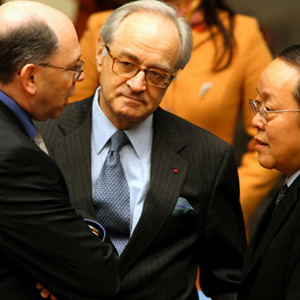5+1and the Iranian nuclear dossier
By Editorial

For the first time in the New Year, the Foreign Ministers of the Permanent members of the Security Council and Germany will meet in Berlin on Tuesday to take stock of the latest situation with regard to the Iranian nuclear program. The Berlin meeting will convene at a time when the relations between Iran and the IAEA are entering a new phase.
Last week the Director General of the IAEA visited Tehran and held a number of meetings with Iranian officials including the Supreme Leader in which the following important points were emphasized by the leader.
First, as has been stressed on different occasions, the Islamic Republic of Iran as a matter of principle and in accordance with Islamic Law is against the production and use of nuclear weapons. Second, in line with its policy of respecting international treaties, Iran has observed its obligations under the Non Proliferation Treaty. Third, under these circumstances, there is no justification to keep the Iranian nuclear file in the Security Council.
After his return to Vienna, Mr. El-Baradei announced that Iran has agreed that it would respond to the remaining outstanding issues in four weeks. It is to be noted that according to Mr. El-Baradei’s last report, Iran has already clarified a number of outstanding issues including the cases of P-1and P-2 centrifuges.
Another important development which has changed the overall international atmosphere regarding the Iranian nuclear dossier was the last month publication of the NIE (National Intelligence Estimate) by the entire US intelligence community in which it was clearly stated that since 2003 Iran has not pursued a nuclear weapons program.
After the issuance of the NIE, the Bush Administration has intensified its efforts to garner supports for adoption of another sanction resolution against Iran. Nevertheless, the NIE has already inflicted damages upon the US position. It is now a hard sale for the US to convince others that Iran is pursuing a nuclear weapons program, hence the need for more sanctions against Tehran. Moreover, the US position has been further weakened by the fact that Mr. El-Baradei has, on numerous occasions, indicated that the Agency has not found any diversion in Iran’s peaceful nuclear activities.
Under such circumstances, it seems that the US will be in a very difficult position to receive the support of all 5+1 countries for adoption of a meaningful sanction resolution. It is possible that the US will not push for a tough resolution and seek the unanimous support of other countries for a mild resolution in order to show that there is a consensus among major international players on Iran’s nuclear activities. It is also possible that the US will not seek a decision at the 5+1 meeting at this juncture. The US is interested to bring back the momentum for possible further action within the Security Council at the opportune time.
The history of the last couple of years suggests that nothing has been achieved through confrontation and that threat of any sort has not helped resolve the problem. The 5+1 countries should not resort to sanctions, threats or bellicose statements. They should, rather, support the IAEA efforts to resolve all outstanding issues so that the nuclear dossier can be sent back to the Agency. It is high time that all sides spare no effort to begin negotiations without any pre-condition.

